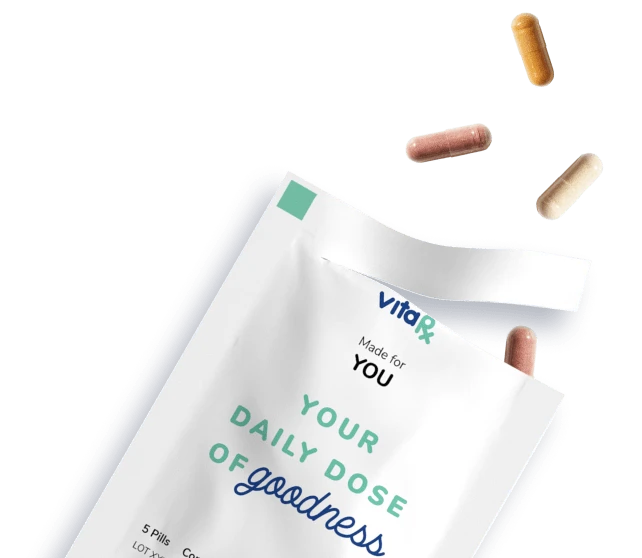Last update: March 25, 2025
9 minute read
What are Flaxseeds?
Explore the true potential of flaxseeds. Learn about their health benefits, nutritional value, and how they boost your wellness journey.

By Derick Rodriguez, Associate Editor
Edited by Dr. Dimitar Marinov, MD, RDN, PhD

Has your search for a "superfood" led you to the humble flaxseed? You're not alone! Increasingly, more people are uncovering the rich, health-boosting potential tucked away within these small, nutty seeds.
If you're asking yourself, "What's the big deal about flaxseeds?" then you're about to embark on an enlightening journey. Are you ready to uncover the secrets of this ancient crop?
Key takeaways
- Flaxseeds are a nutritional powerhouse, rich in fiber, omega-3 fatty acids, and lignans
- While flaxseeds have many benefits, overconsumption can lead to digestive discomfort and hormonal imbalance
- Flaxseeds need to be ground before consumption for optimal nutrient absorption
What are flaxseeds?
Well, they're plant-based foods that pack a powerful punch! Chock full of healthy fats, antioxidants, and fiber, flaxseeds are a "functional food" that can greatly boost your health.

Why is flaxseed considered a superfood?
Flaxseed, a small yet mighty seed, has earned the title of a superfood because it's an incredible source of essential nutrients. It's a plant-based food that provides healthful fat, antioxidants, and fiber. Some people refer to it as a “functional food,” implying it's not just nourishing, but can also boost your health.
Where does flaxseed come from?
Let's take a moment to appreciate flaxseed's long history. It's been cultivated as a crop in ancient civilizations like Egypt and China. In India, it's played a significant role in Ayurvedic medicine for thousands of years. But what makes it so special?
What are the nutrient components of flaxseed?
The nutrients in flaxseed are a significant part of what makes it a superfood. They include:
- Lignans, which are a type of antioxidant
- Dietary fiber that aids digestion
- Protein for muscle repair and growth
- Polyunsaturated fatty acids like alpha-linolenic acid (ALA), or omega-3 may support heart health, but they must first convert ALA into EPA and DHA which happens to an extremely small degree
It's the potent combination of these nutrients that may help lower the risk of various health conditions. Now, it's essential to note that there is ongoing research into all the potential benefits of flaxseed, and while there is not currently enough evidence to support all of these claims, the existing research is promising.
VitaRx Tip
Eating flaxseed isn't a magic bullet for health, but it can be a powerful tool in your wellness arsenal.
How can flaxseeds benefit your health?
The health benefits associated with flaxseeds are pretty vast. The nutrient-dense profile of flaxseeds has made them a popular choice among health enthusiasts. However, it's important to remember that while flaxseeds can contribute to better health, they're not a replacement for a balanced diet and healthy lifestyle.
Does flaxseed improve heart health?
When it comes to heart health, flaxseed may help. The American Heart Association recommends eating more fiber and omega-3s to boost heart health. However, they recommend omega-3 from animal sources rather than ALA.
Still, flaxseed contains some, along with lignans. Plus, flaxseed also contains phytosterols that help prevent the absorption of cholesterol in the intestines. This could help reduce levels of low-density lipoprotein (LDL), or “bad,” cholesterol in the body.
Now, connecting this with the larger picture of nutritional supplements, flaxseeds offer a natural, whole-food alternative to packaged supplements. Today, you can find flaxseed in various forms, including seeds, oils, powder, tablets, capsules, and flour.
While these forms can all contribute to your health, I recommend starting with the whole or ground seeds to get the most benefits. Plus, it's a simple and delicious addition to your favorite meals.
VitaRx Tip
Remember, balance and variety in your diet are key, and while flaxseed is a wonderful addition, it should be part of a well-rounded, nutrient-rich diet.
How can you include flaxseeds in your diet?
Flaxseeds may be tiny, but their health potential is enormous. If you're new to the world of flaxseeds, don't fret. Adding them to your diet is surprisingly simple, and the nutritional benefits are worth the effort.
What are some easy ways to use flaxseed?
There are many ways to add flaxseed to your daily routine. Here are a few suggestions:
- Sprinkle ground flaxseed onto your morning cereal or yogurt.
- Add it to your smoothie for a nutrient boost.
- Mix it into your baking mixes for muffins, bread, and cookies.
- Toss it into your salads or soup for added texture.
Just remember, heat can damage the omega-3s in flaxseed, so add them after cooking whenever possible.
Can you eat flaxseed whole?
While whole flaxseeds still have some nutritional benefits, your body can absorb nutrients better from ground flaxseeds. The outer shell of whole flaxseeds is quite hard and may pass through your digestive system undigested. Thus, I strongly recommend opting for ground flaxseeds for maximum absorption of those beneficial nutrients.
Are there any side effects of flaxseeds?
While flaxseeds are generally safe for most people, they aren't suitable for everyone. It's always best to consult your healthcare provider if you have any specific health conditions or concerns.
Who should be cautious when consuming flaxseed?
Certain people should exercise caution with flaxseed. These include:
- Pregnant women: Because flaxseed might act like estrogen, pregnant women should be cautious.
- People with digestive problems: Flaxseed is high in fiber, which might be a problem for people with bowel conditions.
- People with a history of hormone-sensitive cancers or conditions: Because flaxseed might act like estrogen, it might be a risk for people with hormone-sensitive conditions.
- People on prescription medication: There may be issues with people taking prescription medication, especially blood thinners.
Now, tying flaxseeds back to the broader context of nutritional supplements, remember that supplements should be an addition to a balanced diet, not a substitute for good nutritional habits.
VitaRx Tip
It's crucial to get a variety of nutrients from a range of foods, not just rely on supplements.
Why are flaxseeds considered a superfood?
So far, we've delved into the benefits and potential side effects of flaxseeds. But why are they often dubbed as a 'superfood'? Let's cut through the buzzword and see what the hype is all about.
What makes flaxseeds a superfood?
The term 'superfood' might seem like it's straight out of a Marvel movie, but it's actually used to describe nutrient-rich foods that are especially beneficial for health and well-being. Here's why flaxseeds deserve the title:
- Omega-3 Essential Fatty Acids: These are 'good' fats that have heart-healthy effects. Flaxseeds are a rich source of alpha-linolenic acid (ALA), a plant-based omega-3 fatty acid that is poorly converted into the EPA and DHA that the body can actually use.
- Dietary Fiber: Flaxseeds are high in both soluble and insoluble fiber, promoting good gut health.
- Quality Protein: Flaxseeds are a great source of plant-based protein.
- Lignans: Flaxseeds contain up to 800 times more lignans than other plant foods. These have antioxidant and estrogen properties.
Now, just because flaxseeds are classified as a 'superfood', it doesn't mean they're the ultimate panacea. No single food, not even one as powerful as flaxseed, can assure good health if it isn't part of a balanced diet.
Remember when Popeye used to eat his spinach? He also had a varied diet (and lots of Olive Oyl's love). So, while flaxseeds are a fantastic addition to your dietary routine, they should be included as part of a well-rounded, balanced diet.
How does flaxseed intake compare across different diets?
When talking about nutrition, it's fascinating to see how different diets can affect your intake of certain nutrients. To put the spotlight on flaxseeds, let's take a look at how the average daily flaxseed intake compares across different diet types.
Diet Type | Average Daily Flaxseed Intake (Grams) |
|---|---|
Vegan | 15 |
Vegetarian | 10 |
Pescatarian | 7 |
Omnivorous | 5 |
Caption: A comparison of average daily flaxseed intake across different diet types. Data sourced from National Health and Nutrition Examination Survey (NHANES).
From the data, it's evident that vegans, on average, consume the most flaxseeds daily, followed by vegetarians, pescatarians, and omnivores. This could be attributed to the higher focus on plant-based foods in vegan and vegetarian diets.
Advantages and disadvantages of including flaxseeds in your diet
Adding flaxseeds to your diet can bring many health benefits. However, like anything in nutrition, there are also potential downsides to be aware of.
Frequently asked questions (FAQ)
As we wrap up our discussion on flaxseeds, let's answer some questions that frequently pop up when this superfood is mentioned.
Final thoughts
Well, we've certainly "sown" the seeds of knowledge on this topic! (Okay, I promise no more puns, but I couldn't help "flaxing" my humor muscles just a bit.) In all seriousness, flaxseeds are an incredible addition to your diet, providing a wealth of nutrients and health benefits.
Remember, it's not about making drastic changes but incorporating little, healthy choices into your daily routine. Here's to "flaxing" your health with flaxseeds.
Source
Editor

Derick Rodriguez
Derick Rodriguez focuses on editing health and wellness-related content. With over half a decade of experience in the digital realm, Derick has developed a unique skill set that bridges the gap between complex health concepts and accessible, user-friendly communication. His approach is deeply rooted in leveraging personal experiences and insights to illuminate the nuances of health and wellness topics, making them more approachable and empowering readers with knowledge and confidence.
Fact checker

Dr. Dimitar Marinov
Dr. Marinov has years of experience in scientific research and preventive and clinical medicine. His publications in peer-reviewed journals are on nutritional status, physical activity, and musculoskeletal disorders among adolescents.
At VitaRx, we're not just passionate about our work — we take immense pride in it. Our dedicated team of writers diligently follows strict editorial standards, ensuring that every piece of content we publish is accurate, current, and highly valuable. We don't just strive for quality; we aim for excellence.
Related posts
While you're at it, here are some other relevant articles you might be interested in.

Get your personalized vitamin recommendations in less than
5 minutes.
Get your personalized vitamin recommendations in less than
5 minutes.







